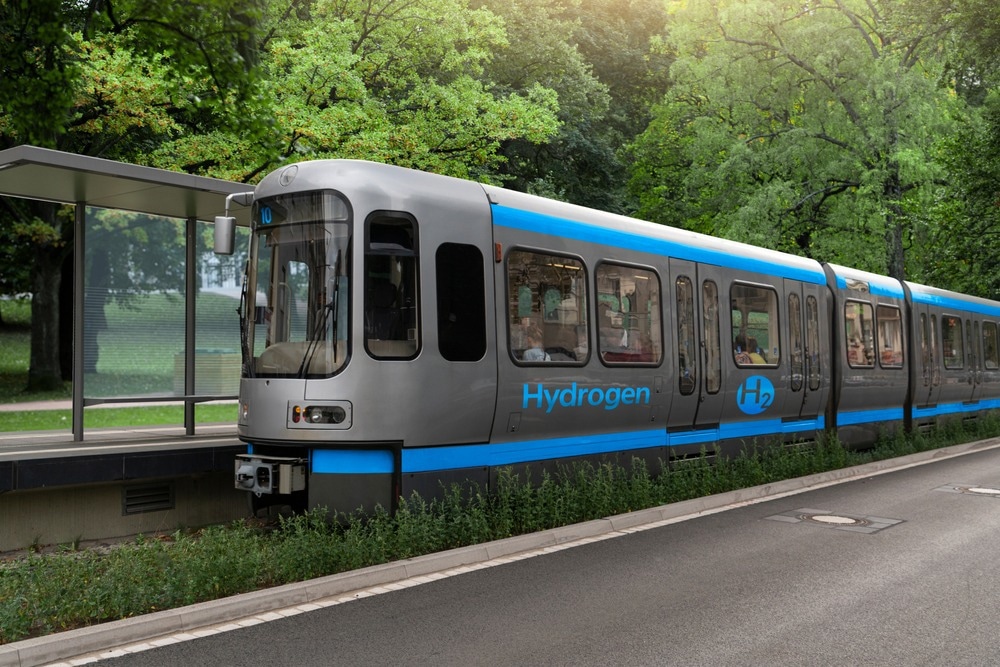A new paper published in the journal International Journal of Hydrogen Energy has investigated on-board hydrogen storage and refueling technologies in the rail sector.

Study: Review and comparison of worldwide hydrogen activities in the rail sector with special focus on on-board storage and refueling technologies. Image Credit: Scharfsinn/Shutterstock.com
Improving the Sustainability of the Rail Industry
The rail industry is a key sector in the modern world, moving vast numbers of passengers and amounts of freight every day in the majority of countries. Transporting goods and individuals across the rail network is generally safer and more efficient than using road vehicles, but the sector comes with its own issues.
Diesel trains are still overwhelmingly used globally due to a lack of sufficient track electrification in multiple locations. In many areas, the economic benefits of rail network electrification cannot be justified, as it requires significant capital investment and updates to existing infrastructure.
Diesel fuel is a well-recognized contributor to climate change and air pollution, which presents challenges for the rail industry in terms of improving its environmental friendliness and sustainability. Using battery-powered trains on fully or partially electrified rail networks is one option, but the aforementioned cost and technical challenges associated with this strategy have drawn the attention of researchers and industry to the use of hydrogen fuel.
Hydrogen Trains
Hydrogen is a key alternative fuel in the move toward a zero-carbon economy. It can be produced from both fossil-fuel and renewable energy sources and has sufficient energy density to meet the power demands of vehicles, including trains.
A distinct benefit of utilizing hydrogen in trains is its compatibility with current stock, which overcomes the cost and technical challenges associated with electrifying large proportions of rail networks. Two main options exist for utilizing hydrogen to provide rail transportation: Hydrogen fuel cells and hydrogen-powered internal combustion engines (ICEs.)
In the case of hydrogen ICEs, additional batteries can be used to recover braking energy in a hybrid system in the same way that hybrid cars work. This is not mandatory, however, as the engine can be operated in a transient mode. Other options include a bi-mode system configuration, which combing fuel cells or ICEs with overhead powerlines.
The long-term and high energy demands of the rail industry and the urgent need to decarbonize the sector provide an economic incentive for the long-term production of hydrogen fuel, improving its competitiveness with conventional fossil fuels. The operational flexibility demanded by the rail industry of hydrogen power, similar to diesel trains, requires reliable on-board storage and hydrogen delivery and refueling technologies.
The Study
On-board hydrogen fuel storage and refueling systems in the rail transport sector are the focus of the review. The authors have noted that there is currently a significant literature body of research projects and developments in technologies in the rail industry for various classes of vehicle. Multiple successful proof-of-concept trials since 2002 have demonstrated the suitability of hydrogen trains for the rail industry.
Fuel cells are a mature technology, whereas the authors have highlighted that hydrogen combustion is still underdeveloped in the rail sector. Currently, several experimental programs are evaluating the performance and suitability of hydrogen trains to meet the demands of rail transport and freight. More government funding and demonstrator trains are urgently needed in the rail sector.
The study analyzes the current state-of-the-art of hydrogen storage in terms of available technologies, installation concepts, hydrogen amount, and pressure levels. Additionally, current refueling concepts for fleets and demonstration projects are compared by the authors. Furthermore, currently available storage systems developed by global manufacturers are evaluated in terms of available technical data.
Study Conclusions
The paper has presented several conclusions based on a comprehensive review of the current research, technical perspectives, and projects in the rail sector for hydrogen storage and refueling.
Current storage systems produced by worldwide manufacturers are potentially suitable for rail fleets. However, currently, there is no prevailing hydrogen storage technology in sight for freight locomotives. Freight locomotives have significantly higher energy demands than passenger locomotives. One solution could be the development of LH2 rail-certified storage tanks.
Currently, on-board hydrogen storage systems do not reach technical targets. There is an urgent need for research in the area of CGH2 storage systems to meet technical demands such as pressure. In terms of hydrogen refueling, one critical challenge is delivery speed, which, if overcome, will make refueling systems comparable to diesel fueling. Other issues include temperature rises during delivery, which presents safety and technical challenges.
In summary, there are several challenges associated with hydrogen fuels for the rail sector which must be overcome in future research if they are to be considered a viable commercial alternative to diesel fuel. Future development in this research area could be aided by further detailed studies and comparisons of systems for rail freight, hydrogen demand analyses, and the investigation of hydrogen’s competitiveness with battery power in the rail industry.
More from AZoM: What is the Function of Isotopic Analysis?
Further Reading
Böhm, M et al. (2022) Review and comparison of worldwide hydrogen activities in the rail sector with special focus on on-board storage and refueling technologies International Journal of Hydrogen Energy [online] sciencedirect.com. Available at: https://doi.org/10.1016/j.ijhydene.2022.08.279
Disclaimer: The views expressed here are those of the author expressed in their private capacity and do not necessarily represent the views of AZoM.com Limited T/A AZoNetwork the owner and operator of this website. This disclaimer forms part of the Terms and conditions of use of this website.